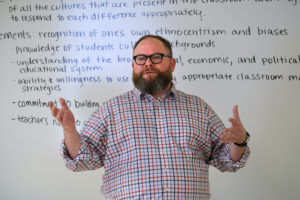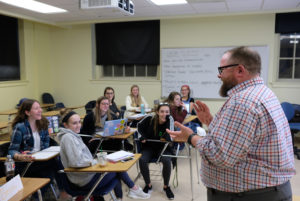
College of Education Associate Professor John Broome. Photo by Norm Shafer.
College of Education Professor John Broome’s Online Learning Collective, a Facebook group launched last week that now boasts over 16,000 members, was mentioned in an NPR story about the challenge of transitioning in-person courses to online. The article also features former UMW Digital Studies instructor Sean Michael Morris.
“Everyone’s freaked out,” says Sean Michael Morris. He’s in the School of Education and Human Development at the University of Colorado, Denver and the director of Digital Pedagogy Lab, an organization focused on digital learning, technology and social justice. He’s one of the curators of Teaching Online With Care, a crowdsourced document collecting ideas about this transition. There’s also a Facebook group with 15,000 members started by John Broome at the University of Mary Washington, called “Online Learning Collective.” Read more.
